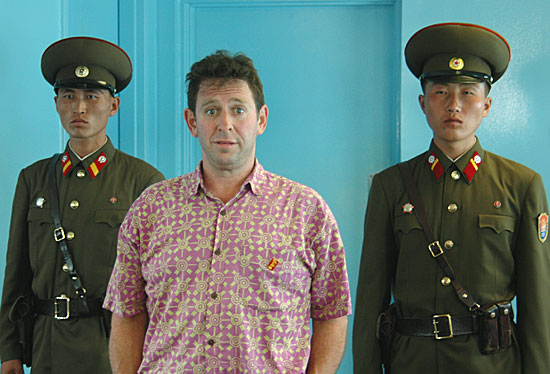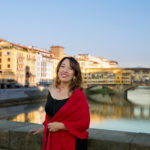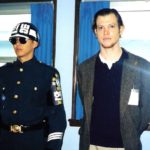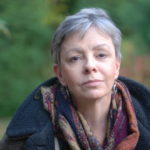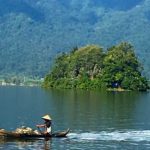Ron Gluckman is an American journalist who has been roaming Asia for more than a decade. Home base throughout the 1990s was the idyllic Lamma Island outside Hong Kong. Late last year, he moved to Beijing.
Born in San Francisco, Ron had a pretty typical career bouncing between beats, covering everything from scandals to city councils at a variety of newspapers in Northern California and Alaska. One early constant was his coverage of arts and music, and he wrote for music magazines like Creem, Pulse and Rock. He also wrote film reviews for the annual “Video Home Guide.” Although he wanders widely around Asia (and further afield), Ron mixes travel tales with news, analysis, features and business stories. His byline has appeared in newspapers and magazines around the world. He is a regular contributor to Time and Asiaweek, and has been a guest discussing travel in Asia on CNN. Some of his travel tales were included in the collection, “In Search of Adventure: A Wild Travel Anthology.” Ron has covered nuclear testing in Tahiti, been in house arrest in Burma, taken tea with the Dalai Lama, surfed cyberspace with Arthur C. Clarke, sailed with Sea Gypsies across the Sulu Sea and with the little-known (and landlocked) Mongolian Navy.
How did you get started traveling?
When I was 14, I went on a summer trip to Israel with a group of Jewish kids from across the USA. The trip got unexpectedly extended when an El Al plane was bombed by terrorists in the Middle East. We were in Europe at the time, and were rerouted several times by the subsequent scheduling chaos. I got to take in the sights of London, Paris and Rome on the way. Even before I soaked up the intoxicating aromas of the old Arab markets of Jerusalem, I was totally hooked on the excitement, adventure and unpredictability of travel. I still am.
How did you get started writing?
Actually, I started as a music critic and my motivation was pretty selfish. I was in high school and a classmate had an older brother who worked as a disc jockey at a college radio station. This was in the 1970s in San Francisco, where sound was king. He got piles of records (those big black CDs from the past) free in the mail. Plus free passes to concerts and clubs. I was heavy into music and thought that was pretty cool. Soon, I was writing record reviews for school papers which led to an early career as a rock critic and entertainment writer.
What do you consider your first “break” as a journalist and/or travel writer?
There really weren’t big breaks; rather a series of steps, and not all of them particularly logical. Unlike so many colleagues, and more so these days, I never had a career plan. Perhaps that’s because I didn’t get a journalism degree like many of them. I went into journalism for fun and pretty much just followed the path that seemed most interesting (my Philosophy of Fun). Hence, my tour of duty as entertainment editor at the Anchorage Times followed by a stint as managing editor of a tiny weekly in the Alaskan bush (the Bristol Bay Times), which was probably the most fascinating job I’ve had. Papers were delivered by float plane to native villages where English was rarely the main lingo, the tales were often life-and-death, and I covered them by boat or hitching rides with ex-Vietnam Vet pilots who were hiding out in the Great Country. If there was one big break it would have to be a fellowship to Oxford University, where I spent a year in the Journalism Fellowship Programme. This largely involved drinking in pubs and arguing world events with younger, vastly-better informed students who actually attended classes. As “distinguished” fellows, we were supposed to be working on more serious projects. I did a bit of research on a book about my father and his parents escape from Nazi Germany in late 1940. Amazingly, I got an agent and book publisher lined up, then took off on a long trip following their escape route, overland from Berlin through East Europe, across the USSR (not so easy in those days) and through China. Getting across North Korea proved a problem, so I hunkered down in Hong Kong until I snuck into the People’s Paradise, than talked my way onto a boat from Japan to the USA, finishing the recreated journey. I never wrote the book, but by then was established as a foreign correspondent roaming Asia, which I have been doing ever since. So, the Oxford Fellowship totally broadened my horizons. It got me out of daily journalism and overseas, where I have been able to indulge my passions for travel, spinning bizarre yarns about exotic cultures where people wear funny things on their heads.
As a traveler and fact/story-gatherer, what is your biggest challenge on the road?
In the old days, it was getting there and getting around. Nowadays, travel is easy to practically every point on the planet, and the Internet facilitates not only the delivery of story and pictures on deadline, but also research, appointment scheduling and all kinds of other critical work. It’s really quite astonishing to think back barely a decade ago, when I covered the fall of the Berlin Wall and spent a fortune on phone calls, digging into my hotel wall to pull out phone wires which I had to splice to file copy to newspapers back home at a few bytes a second. The actual terrain has changed, too. Places like Burma, Laos, Vietnam, Mongolia and Tibet were so restrictive. Travel in China was a challenge (now there are Starbucks decafe lattes) and there were always wars and kidnappings in so many places. Getting in and getting around is so much easier, and few places are as restrictive of journalists in the past. The biggest challenges are on the other end: attention spans and interests of editors and readers in the Television Age. The battle now is against the formulas of been-everywhere, done-everything media, and the ever-shrinking layouts and budgets.
What is your biggest challenge in the writing process?
Doing the writing. That’s real work, sitting alone and staring at a screen. It’s the thing nobody knows until they have done it. Naturally, travel writing seems like such a lark. The research part surely is. Despite all the frustrations of set up, once you’re on the road, it’s a blast, getting out in the field, where you are sparked by scenery as you talk to people and try to figure things out. In comparison, the actual writing is usually a drudge. You already know the story, so the surprise is gone, at least for the writer. The challenge is to tell it in a way that gives readers a sense of the same excitement and discovery you felt.
What is your biggest challenge from a business standpoint? Editors? Finances? Deadlines? Promotion?
After all this time in the business, I find the biggest challenge from a business standpoint (besides the regular change of editors) is staying fresh. Writers get jaded from experience. The key is to continue challenging oneself. Hence, I left music writing when all the shows started running together, and I tired of talking to all the heavy-metal bands who invariably named the Beatles and Mozart as influences. This is all part of my personal Philosophy of Fun; there are just so many things out there to write about, you might as well choose topics that interest you. I’m the reader that I write for, so I largely choose topics I want to read about. You just need to keep climbing new mountains, surprising yourself as a writer. That’s why I’ve never really specialized in any topic. I lived in Hong Kong from 1991-2000, and for the last six years I only did two stories from Hong Kong. Instead, I try and go where I’ve never been, tackling subjects that confound me.
Do you do other work to make ends meet? If so, what kind of work?
Nope. I’m strictly a journalist, although I mix news, features, business and the rest with travel. There was a point in my career where I got roped into doing some semi-commercial work. One large publishing group that was my main patron, was also involved in organizing some regional conferences. Once a year, I worked as an editor, putting out a daily conference newspaper. It wasn’t particularly high-quality or unbiased, but it was essentially journalism, talking to people, getting the details and communicating the stories. Except that it paid far better; a couple of weeks work brought in the equivalent of 3-4 months of freelance writing. But I haven’t done anything like that in many years.
What travel authors or books might you recommend and/or have influenced you?
I HATE travel books. This always startles colleagues, but I think the most boring thing in the world is to read about someone else’s trip. Especially on a trip. Even worse is when it’s well told: then I’m simply jealous. But of course, I have been influenced by the best of the road reporters, mainly scribes who mixed travel stories with politics, culture, etc. Hunter Thompson (in his early heyday), P.J. O’Rourke and Tim Cahill come to mind. I’m also happy to see the same sort of goofy excitement permeate the writing of many young wanderers, like Rolf Potts on this site. These are people who put the material first, and the philosophy and reflection in the background, rather than the other way around. But generally, I’d rather read a good novel than anything else. Good writing is what I relish. Most travel books on the market just don’t grab me. One notable exception is Jan Morris, who has always been spectacular.
What advice and/or warnings would you give to someone who is considering going into travel writing and journalism?
Don’t.
I feel that travel writing and journalism in general suffer from so many people “going into” this field. Better to be drawn in because of what you want to say. The best preparation is to read, travel and gather experience, rather than sit in some classroom studying the formulas. I worked as a librarian, phone operator, youth counselor, waiter, nature worker, tree climber and mail carrier before getting into journalism. This broad experience has been, throughout my career, an invaluable asset in talking to people and understanding situations.
What is the biggest reward of life as a travel writer and journalist?
Just being able to go to amazing places and see amazing things. And find out stuff about one’s own personality and mettle. I hope no editors are reading this, because despite all the whining about the work involved, since day one, I’ve always been amazed to get paid for doing this. My greatest rewards come from getting things right. Journalism has been overly-glorified since the Watergate Years. But at the most basic, I think journalists are idealists and we all believe, at least at the outset, that, in our own small ways, we contribute to the greater good. It’s easy to get jaded, given the media’s glaring faults, its insensitivity and tendency to trivialize some subjects through overkill. But I’m still an idealist, more so having spent so much time in the developing world, where the media is often the only instrument of hope for change and openness in the lives of people and governments. It’s sometimes a small pleasure, but you try and shine your spotlight on the good deeds and illuminate some of the wrongdoing. You don’t change the world, but sometimes the good guys get credit, and the crooks get caught. Travel writing has different thrills, particularly the connection between different cultures. Travel is so much about surprise. Conveying that to your armchair audience is almost as thrilling as experiencing it firsthand. And despite all the negatives about travel, I still think it leads to greater understanding. No person who has been to China or Peru, interacted with the people and peaked at the culture, will ever look at those places exactly the same way.
Why do you work freelance? Wouldn’t a staff job be better?
On the freelance side there is the freedom. I make about one-half of the money as I did at my last staff job (chief reporter, roaming Asia doing wacky features and in-depth investigations for the Sunday Morning Post newspaper and magazine in Hong Kong) in 1994. I quit the day after finishing my agreed minimum term of six months. Otherwise, I have held no staff position since 1989. The money is less, but the rewards are enormous in other ways. I’ve had some great bosses, those who challenged me and helped improve my writing. But I’ve also suffered my share of bad editors. As a freelancer, the irony is that I have way more editors. But, I can fire the ones I don’t like. Ultimately, I’m the greatest boss I have ever had. I may not push myself enough, but I trust myself to make the proper judgement calls. The result is that I never have anyone telling me what to write, or how to write it. I not only get to pick topics that interest me personally, but to tell the stories my way. Accuracy is very important to me as a writer. This freedom means never seeing anything in print that I don’t want my name attached to. That means I usually go to sleep with a smile, and wake up eager to get to work.

